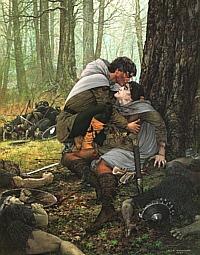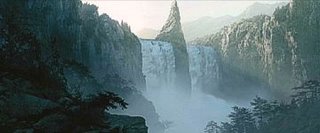TTT: Bk 3, Ch 1
"'Farewell, Aragorn! Go to Minas Tirith and save my people! I have failed!'
'No!' said Aragorn, taking his hand and kissing his brow. 'You have conquered. Few have gained such victory. Be at peace! Minas Tirith shall not fall!'
Boromir smiled."
In Tolkien's original draft, the material in this chapter was originally part of the text intended for "The Breaking of the Fellowship". If one reads The Lord of the Rings as it is presented in a single volume, that is obvious for the flow of the action is interrupted in what seems an unnatural way. And this is a fairly short chapter. Of course, in order to have readers clamoring for more in 1954, the publishers obviously preferred a more ambiguous cliffhanger. So the material was split so that the first volume, The Fellowship of the Ring, ended with Frodo and Sam's crossing of the Anduin to the eastern banks. In The Two Towers, the story picks right up where Fellowship left off...
Suddenly, the great horn of Gondor blew. Aragorn, now at the summit of Amon Hen, knew that Boromir was in need. He could also hear the harsh voices of Orcs coming from the bottom of the hill. As he raced down the hill, the yells of the Orcs died away. Finally, in a glade about a mile from the boats, he finds Boromir, riddled with arrows with black feathers. Despite a valiant fight, Boromir has been mortally wounded trying to protect Merry and Pippin, who were taken alive by the Orcs. Boromir's death scene is made more poignant in the film version, but he confesses here to Aragorn that he tried to take the Ring from Frodo. After telling Aragorn of the fate of the hobbits, he begs him to go to Minas Tirith and save his people. Aragorn assures him that Minas Tirith will not fall (thought he does not know yet if that will be his destination). Before Boromir can speak again, he dies. Sean Bean's portrayal of Boromir ends with his establishing a closer connection to Aragorn, who pledges to save "our" people. Boromir acknowledges Aragorn as "my brother, my captain...my King". This is something he refused to do at their first meeting in Rivendell. I always felt that in this version, Boromir at least dies with more hope that the quest has not ended in vain.
After telling Aragorn of the fate of the hobbits, he begs him to go to Minas Tirith and save his people. Aragorn assures him that Minas Tirith will not fall (thought he does not know yet if that will be his destination). Before Boromir can speak again, he dies. Sean Bean's portrayal of Boromir ends with his establishing a closer connection to Aragorn, who pledges to save "our" people. Boromir acknowledges Aragorn as "my brother, my captain...my King". This is something he refused to do at their first meeting in Rivendell. I always felt that in this version, Boromir at least dies with more hope that the quest has not ended in vain.
Soon, Gimli and Legolas arrive. They are left with a number of decisions to make. Should they leave Boromir's body or bury it? Should they follow Merry and Pippin or go east to help Frodo? In fact, at this point they are not sure where Frodo has gone. There isn't enough time to bury Boromir or even build a cairn over his body. So they decide to set him adrift in one of the boats, with his weapons and the weapons of the Orcs he has slain to ensure that, in this way, "no evil creature dishonors his bones". Tolkien, being a student of Norse culture and mythology, I believe saw this as a version of a "viking funeral" although without the immolation part.
Originally, when Aragorn explains what happened to Boromir he gives them the whole story, including the encounter with Frodo. From Tolkien's first draft:
'Something happened on the hill to make him fly. I do not know all, but I know this. Boromir tried to take the Ring by force.'Then Tolkien wrote in pencil "Don't let Trotter tell of Boromir's misdeed?" The final version reads:
Exclamation of horror from Legolas and Gimli.
'Think not ill of him,' said Trotter. 'He paid manfully and confessed.'
'He fled, certainly,' said Aragorn, 'but not, I think, from Orcs.' What he thought was the cause of Frodo's sudden resolve and flight Aragorn did not say. The last words of Boromir he long kept secret.Exactly why this was changed is not made clear. Tolkien makes no comment on it in any of his letters and Christopher Tolkien does not seem to have found any explanation among his father's notes. We can only speculate that, feeling a sort of kinship to Boromir, he didn't want to tarnish his heroic deeds. Perhaps Aragorn felt that it could just as easily have happened to him were he in the same situation and didn't feel it was his place to judge. In any case, the ultimate reason for Frodo fleeing the company was irrelevant to the situation at hand.
There are a couple of plot points worth mentioning. Aragorn, Legolas and Gimli scour through the weapons and trinkets of the Orcs and manage to find the Numenorean blades that belonged to Merry and Pippin. Aragorn takes these for safe-keeping to return to the hobbits, reminding Legolas and Gimli of the Orcs aversion to touching such blades of Westernesse. Merry's of course plays an important part in the slaying of the Witch-King. Peter Jackson's film, The Two Towers never really accounts for Merry keeping his blade of Lothlorien in his possession. Though a sheath of his Elven blade is found by Gimli, where is the knife?
Aragorn and company also notice that this is a strange batch of Orcs. Most are taller than most, and have many characteristics of men. These are in fact, Uruk-Hai. Saruman "bred" them, though Tolkien doesn't go into much detail as to exactly how - only that they were crossed between standard Orcs and goblin Men. What Tolkien meant exactly by "goblin men" has never been explained. We know that Orcs are descended from Elves that were corrupted and twisted by Morgoth in the First Age. But what exactly "goblin men" are is an unanswered question.
Does this mean "male goblins", those Orcs that were more primitive that lived in both the Misty Mountains and Ered Mithrin ("grey mountains") to the north? Whatever the ingredients in the mixture, these Uruk-Hai were given the benefit of greater size and strength as well as the ability to travel in sunlight, and at great speed. Some "sorcery" of Saruman, perhaps. These particular Orcs were identified as being commanded by Saruman because of the mark of the "white hand" upon their shields and "S" runes on their helms.
Anyway, they set Boromir adrift in one of the boats toward the Falls of Rauros:
"The River had taken Boromir son of Denethor, and he wasnot seen again in Minas Tirith, standing as he used to stand upon the White Tower in the morning. But in Gondor in after-days it long was said that the elven-boat rode the falls and the foaming pool, and bore him down through Osgiliath, and past the many mouths of Anduin, out into the Great Sea at night under the stars."
Then Aragorn and Legolas sing a lament to Boromir. The song is in three verses in which they ask the winds of the north, south and west to give them news of "Boromir the Fair". They do not ask the eastern winds for they come from the lands of Mordor. Aragorn notices that there were only two boats on the shore of Nen Hithoel. Two packs are missing and Aragorn notes the direction of hobbit footprints. He concludes that Frodo and Sam have taken the journey to Mordor.
 Now Aragorn is faced with a grave decision; should he go east to follow Frodo or west to help Merry and Pippin? His heart tells him that Frodo's fate is no longer in his hands. He is also unwilling to abandon the hobbits to torment and death. He tells Legolas and Gimli that they must travel light and move swiftly west. Of course, his instructions do not include the corny line from PJ's film "let's hunt some Orc". Fortunately, the trail of the Orcs is not hard to follow as they delight in destroying the land that they pass through.
Now Aragorn is faced with a grave decision; should he go east to follow Frodo or west to help Merry and Pippin? His heart tells him that Frodo's fate is no longer in his hands. He is also unwilling to abandon the hobbits to torment and death. He tells Legolas and Gimli that they must travel light and move swiftly west. Of course, his instructions do not include the corny line from PJ's film "let's hunt some Orc". Fortunately, the trail of the Orcs is not hard to follow as they delight in destroying the land that they pass through.So, the three hunters set off on a chase that would be "accounted a marvel among the Three Kindreds: Elves, Dwarves and Men". The sun sinks into the west as evening falls over the land.
------
[Chronology: February 26th 3019 T.A.]
------
Next: The Riders Of Rohan
(revised 9/11/06)


0 Comments:
Post a Comment
<< Home